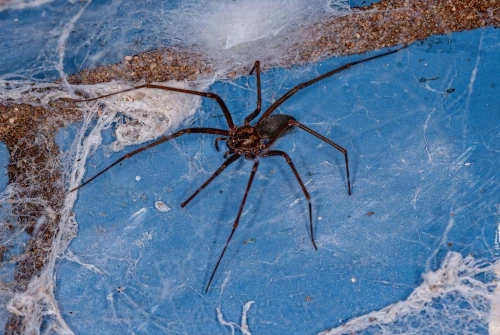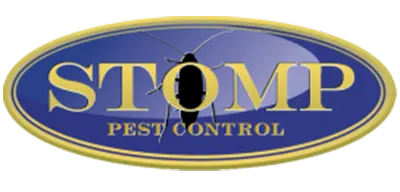If finding a spider makes you cringe, you’re not alone. While many spiders are harmless, several are venomous and pose a danger, especially if they bite you. Join the pest experts at Stomp Pest Control in North Carolina (NC) as they explain the difference between venomous and poisonous spiders and share four NC venomous spiders you should be wary of.
Table of Contents
Difference Between Venomous and Poisonous Spider
A spider’s venom is what makes them extremely dangerous. A venomous spider will inject their prey (or a human) with a toxic substance. This is different from poison that someone has to come in contact with, through touch or ingestion, to have an adverse reaction. An easy trick to remember the difference is that poisonous is passive and venomous is active.
For a spider to be considered poisonous, it would have to cause medical harm when it is ingested or inhaled. So, unless you are eating spiders or inhaling them, a spider can not be poisonous to you. Perhaps this challenges what you previously thought! Now that you know the difference between the two, we’ll share four of the most common NC venomous spiders.
NC Venomous Spiders
Black Widow Spider
The black widow spider, or Latrodectus mactans, is one of the most dangerous spiders in North Carolina.
It is easy to spot with its large, shiny, black body and a distinctive red hourglass shape on its abdomen. However, these markings are only present in adult females. Young spiders and males may have yellow markings or more brown-colored bodies. Outside, black widow spiders nestle under rocks and in wood piles. Be on the lookout for their low-lying webs close to the floor inside your garage, inside a grill, or near wet areas such as swimming pools and ponds. Inside, they find shelter in crawl spaces, or in damp, dark areas such as behind a TV console or underneath a bathtub.
The black widow spider’s bite can be life-threatening to anyone, especially children, the elderly, and immunocompromised individuals. The black widow spider is a neurotoxin which means it affects the nervous system.
Black widow spider bite symptoms include:
- Swelling, pain, and redness around the affected area
- Blue-red spot surrounded by white area
- Headache
- Fever and chills
- Nausea and vomiting
- Muscle cramps and spasms near the bite, spreading and worsening over 6-12 hours
- Sweating
- Tremors
- Shock
- Increased blood pressure
Treatment for a black widow spider bite:
Black widow spiders are perhaps the most common of all NC venomous spiders. If you know or suspect you’ve been bitten by one, you should contact your local emergency care center immediately. After seeking professional treatment, implement the following at-home care.
Take pain medication as prescribed by your doctor. You can also take over-the-counter allergy medicine, such as Claritin or Allegra, to reduce swelling. A cold compress may soothe the affected area and further reduce inflammation. Always follow your doctor’s care advice over anything else.
If you are bitten by a black widow spider, seek medical attention immediately. Once, a little girl put on a shoe that was on her porch outside. Little did she know, there was a black widow spider inside the shoe! The spider bit her and the venom spread quickly from her foot towards her heart. Thanks to prompt medical attention, the girl was hospitalized and the medical professionals stopped the venom spread, saving the girl’s life.
Brown Recluse Spiders
Brown recluse spiders are another one of the NC poisonous spiders you may come across. Their distinct appearance is characterized by a half-inch-long brown body with a violin-shaped mark on its back and three pairs of eyes. Outside, brow recluse spiders enjoy hiding under rocks, in trash piles, and in wood piles. When found indoors, their favorite spots include boxes, shoes, or other dark areas (much like a black widow spider).

A bite from a brown recluse spider can be very dangerous because it causes the tissue around the area to die quickly. Serious complications can result from a brown recluse spider bite, meaning you should seek medical attention right away.
Symptoms of a brown recluse bite include:
- Pain
- Tissue decay at the site of the bite that turns purple in the center
- Joint pain
- Fatigue and lethargy
- Nausea
- Fever and chills
- Seizures and coma (rare, and only if the bite is left untreated)
Any of these symptoms require immediate medical attention.
Treatment for a brown recluse spider bite:
Brown recluse spider bites can be life-threatening if they aren’t treated promptly and correctly. After seeking professional treatment by your local doctor or emergency care center, use the following at-home care.
Always heed the advice of your medical professional first and foremost. They may prescribe pain medication to ease the pain and reduce swelling. Otherwise, you may find that over-the-counter pain relievers or antihistamines may be beneficial in reducing the swelling and subsiding the pain. You can always use a cold compress to further reduce swelling and soothe the infected area.
Yellow Sac Spiders
Yellow sac spiders are another one of the NC venomous spiders. Yellow sac spiders have small yellow or cream-colored bodies and dark-brown coloring around their heads. While they don’t jump, they tend to scurry quickly and may leave a silk strand in their fleeing effort. They are commonly found outdoors in North Carolina in the warmer months. When the weather gets cool in the fall, they tend to move indoors and can be found in closets or dressers.
Yellow sac spiders are the most common cause of spider bites in North America. Their bites are generally not serious, but some people can be extremely sensitive to the venom, leading to more serious complications.
Symptoms of a yellow sac spider bite include:
- Rash
- Fever
- Malaise
- Muscle cramps
- Nausea
- Ulceration around the bite
Seeking medical attention is still important if you’ve been bitten by a yellow sac spider.
Treatment for a yellow sac spider bite:
Seek professional medical attention if you are bitten by any NC venomous spiders, including the yellow sac spider.
Since this spider bite typically doesn’t cause serious side effects, you can usually treat the area at home. Begin by cleansing the affected area with warm soapy water. Follow up with a cold compress and a pain reliever that also reduces swelling. If the bite causes nausea, headaches, or other unpleasant symptoms, go to your nearest emergency care center.
Non-Venomous Spiders in North Carolina
There are a couple of spiders that are common in North Carolina but aren’t dangerous! We’ll share a couple of those now so you can easily identify them and find peace in knowing they aren’t venomous. However, if you are bit by one, you’ll want to apply an antibiotic ointment and a cold press to prevent an infection.
Wolf Spider
A wolf spider is the largest type of spider in North Carolina, measuring about ½ to 2 inches in length. They can be brown or black or have yellow or tan marks, and are known to be hairy. They have three rows of eyes down the middle of their head.
Wolf spiders can be found in wooded areas. While they are not considered dangerous to humans, their bites can be painful.
Symptoms of a wolf spider bite include:
- Redness
- Itchiness
- Fang-like marks on the skin
Treatment for a wolf spider bite:
Apply a cold compress, such as an ice pack, to the area where the spider bit you. Follow up with an antibiotic ointment several times daily to prevent an infection.
False Widow Spiders (aka Noble False Widow)
A false widow spider, otherwise known as a noble false widow, has an uncanny appearance to a black widow spider. Its appearance features a shiny black body with a large, rounded abdomen and thin legs. The telling difference is that it does not have the red hourglass mark that the black widow sports.
False widow spiders are more likely to be found inside basements, closets, and other dark and secluded areas of your home.
A false widow spider bite is not as severe as that of a black widow, but seeking medical attention is still important.
Symptoms of a false widow spider bite include:
- Pain and swelling at the bite
- Fever and chills
- Lethargy
- Nausea
- Headache
- Muscle aches
Treatment for a Noble False Widow bite:
Apply a cold compress, such as a cold cloth or ice pack to the swollen area for 10-15 minutes each hour. Follow up with an antibiotic ointment several times daily to further reduce swelling and prevent an infection.
Ignoring this type of bite and its symptoms can lead to infection and unpleasant side effects.
FAQ About Spiders
What are the characteristics of a spider bite?
If you’ve been bitten by a spider, you’ll notice two puncture marks with swelling or redness. A sore will also develop and the bite will hurt on its onset. You may also feel itchy. Severe spider bites can lead to muscle cramps, intense sweating, and nausea.
Are spiders dangerous?
The majority of spiders are not dangerous and pose little or no threat to humans. However, NC venomous spiders are extremely dangerous and should be avoided at all costs. If you’re bitten by a spider and believe the bite to be detrimental to your well-being, go to your nearest emergency care center straight away.
How can I reduce my risk of getting bit by a spider?
Be vigilant when you’re outside. Avoid walking barefoot in tall, grassy areas. Wear gloves while gardening. Wear insect repellent containing DEET. Clear any cutter indoors to prevent spiders from calling the area home.
Contact Stomp Pest Control to Get Rid of Spiders in Your Home
If you think you’ve seen a poisonous spider around or in your home, the pest control professionals at Stomp Pest Control can help discourage them from finding shelter in your home. The NC venomous spiders are dangerous and pose a threat to your home and family.
We serve several cities in the Triangle including Raleigh, Garner, Wake Forest, Durham, and more.
Contact us at (919) 231-3292 or fill out the form below to learn more about our pest control services and rid your home/yard of NC venomous spiders.

